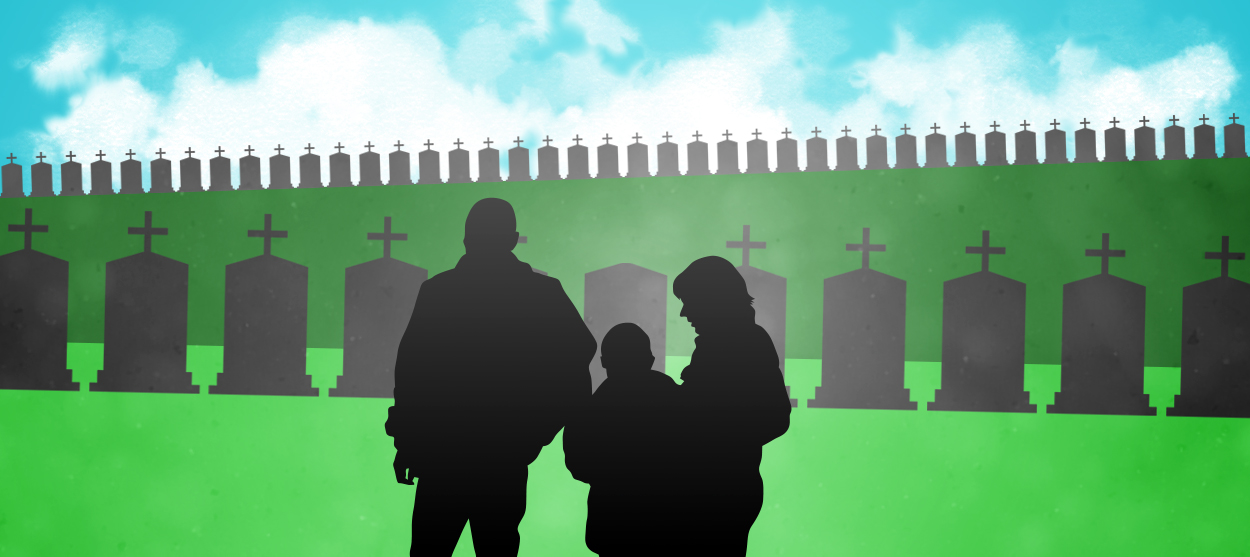How to talk about death with kids if you don't believe in God
I don't want to depress them, but I also don't want to lie to them. What's a parent to do?


A free daily email with the biggest news stories of the day – and the best features from TheWeek.com
You are now subscribed
Your newsletter sign-up was successful
I would love to have faith in the idea that when we die, something lovely and eternal awaits. But I don't. I've dabbled with agnosticism but it seems like a cop out.
Not believing in God or religion, and choosing instead to base your beliefs on steely, cold science, is manageable if it's just about your own relationship with those convictions. But I'm not ready to explain oblivion to children who believe in unicorns, Santa, and the tiny flying lady who buys your teeth when they fall out. While I happily feed my kids these fanciful lies (because they're fun and I know they'll grow out of them), I'm at the point now when my 6- and 4-year-old children want to know what the deal is with death.
Fielding my kids' questions about God, death, ghosts and, most recently, the 19th-century crypts in our local cemetery, has been one of the few parenting challenges that makes me genuinely nostalgic for my own childhood. I grew up in the U.K. where it's normal, regardless of religion or lack of one, to send your children to Church of England elementary schools. Catholic schools are widely considered the best of the lot, so parents have been known to spend years faking their faith (going to church, donating to fundraisers, etc) to secure a spot.
The Week
Escape your echo chamber. Get the facts behind the news, plus analysis from multiple perspectives.

Sign up for The Week's Free Newsletters
From our morning news briefing to a weekly Good News Newsletter, get the best of The Week delivered directly to your inbox.
From our morning news briefing to a weekly Good News Newsletter, get the best of The Week delivered directly to your inbox.
What this means is that British schools, whether you want them to or not, take care of those first innocent wonderings around death and God. I grew up learning about Mary, Joseph, and Jesus, and Our Father Who Art in Heaven at morning assembly, where we also sang hymns. The vicar who visited our school twice a month even brought in fiberglass loaves and fishes. And at Christmas, it's traditional for British elementary schools to put on nativity plays — a kind of Christmas story pageant where children, regardless of their role, wear tunics forged from old bed sheets and crowns made from leftover Christmas tree tinsel.
My atheist, technically Jewish parents didn't exactly back up the vicar's stories, but they didn't directly contradict them either. And they happily cheered five-year-old me's legendary 1985 performance as second angel from the left. All of this Christian pomp served as a theological placeholder until my siblings and I were old enough to think a little more critically and figure out what we thought for ourselves. We weren't even slightly (or at least not lastingly) brainwashed.
My kids, however, go to public school in the U.S. where church/state separation is absolute. This means my husband and I are forced to deal with all this difficult stuff, and we're finding ourselves a little stumped. We don't really want to lie to them about something so huge, but we also don't want to make them miserable and neurotic by offering up our own bleak interpretation.
So far we've found that the most effective response to any tricky questions posed by our 4-year-old is to throw them back at him: "I'm not sure, what do you think happens to people when they die?" Little kids, the narcissists, don't particularly care what grownups' views are anyway, and would much rather tell you what they think.
A free daily email with the biggest news stories of the day – and the best features from TheWeek.com
It turns out our cobbled together but surprisingly effective method of kicking this most contentious of balls down the road isn't so bad. At least we're not using "cutesy language" to talk about death, which professional counselor Tammy Lewis Wilborn told HuffPost can actually do more harm than good. "Children tend to think concretely, not abstractly, so when you use language that's euphemistic, it can actually be more confusing or frustrating," she said. So when we do eventually stop fobbing off our kids, we'll try to avoid the kind of intangible concepts and overblown imagery that seem to go hand in hand with religious life-after-death explanations.
Right now, my son is pretty sure that when people die they turn into statues, and we've not corrected him. And he tells us regularly that his dead grandmother will "come alive again" soon, which is cute in a Wednesday Addams kind of way. Because we're not completely irresponsible, we have tried to explain that this is unlikely. But when he's come back at us with a very detailed, almost messiah like pronouncement that, "She definitely WILL come alive again. Next Tuesday!" we've let it go.
My 6-year-old daughter also struggles with the concept of death, and unlike her brother actually remembers her dead grandmother and misses her. For now, she's happy to share her own theories on spirits and the afterlife, but I know she'll soon need more input from us. And unless shrugging counts as good parenting, it's possible we'll come up short. I may have to befriend an affable English vicar.
Want more essential commentary and analysis like this delivered straight to your inbox? Sign up for The Week's "Today's best articles" newsletter here.
-
 What are the best investments for beginners?
What are the best investments for beginners?The Explainer Stocks and ETFs and bonds, oh my
-
 What to know before filing your own taxes for the first time
What to know before filing your own taxes for the first timethe explainer Tackle this financial milestone with confidence
-
 The biggest box office flops of the 21st century
The biggest box office flops of the 21st centuryin depth Unnecessary remakes and turgid, expensive CGI-fests highlight this list of these most notorious box-office losers
